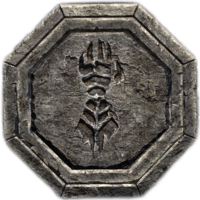The Bagrakh Clan (or Clan Bagrakh) is an Orsimer clan known to have existed since the First Era and resided in Wrothgar. They were one of the founding Orc clans of Old Orsinium in the First Era.[1] Malacath described them as warriors of Old Orsinium, but criticized them for grow to enjoy raiding the weak for cheap thrills, instead of doing it to draw out worthy opposition.[2] King Kurog was a famous member of the clan, noted for founding the Second Orsinium.
HistoryEdit
During the early tenth century of the First Era, Clan Bagrakh committed the Bjoulsae Raids against Breton and Redguard cities along the river. Golkarr and Clan Igrun praised the raids, possibly even taking credit for them, though in the eyes of Men, the Orcs of Orsinium were mainly responsible.[1][3] In 1E 948, King Joile of Daggerfall sent a message to Gaiden Shinji regarding the raids, and as a result the Siege of Orsinium began two years later.[4]
After the Siege, the Malacath Devoted performed a ritual every decade cursing Clan Bagrakh and a number of others under Malacath's orders, for the reason that Bagrakh's raids were the buildup for the invasion of Orsinium.[1]
In his youth, Kurog gro-Bagrakh, the future King of the Second Orsinium, was born into a Bagrakh stronghold located in Wrothgar. When he returned to the stronghold a few years prior to King Ranser's War in 2E 566, he challenged Chief Bolazgar to a duel. Kurog killed Bolazgar and was subsequently made the chief of Clan Bagrakh,[5] though this ended when he was killed in 2E 582.[6][nb 1]
GalleryEdit
NotesEdit
ReferencesEdit
- ^ a b c Flames of Forge and Fallen quest in ESO
- ^ Malacath Aspect's dialogue in ESO
- ^ Ushutha's Journal — Ushutha
- ^ Wayrest, Jewel of the Bay — Sathyr Longleat
- ^ The Chronicles of King Kurog — Zephrine Frey, Chronicler of Wayrest
- ^ Blood on a King's Hands quest in ESO
Note: The following references are considered to be unofficial sources. They are included to round off this article and may not be authoritative or conclusive.
|
||||||||||||||||||||||||||||||||
